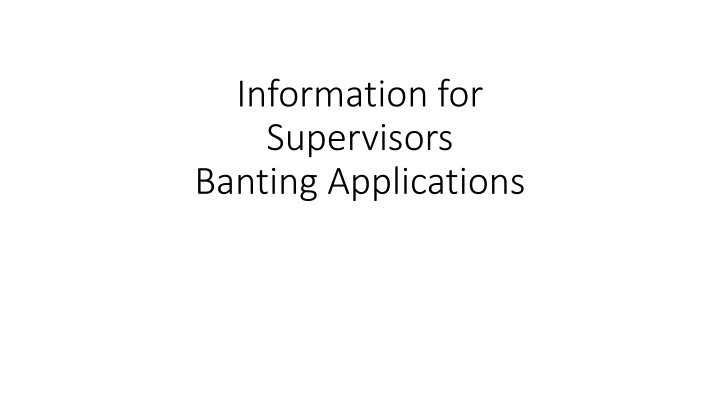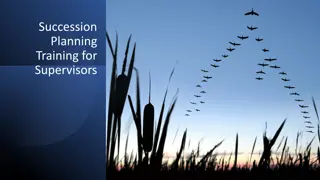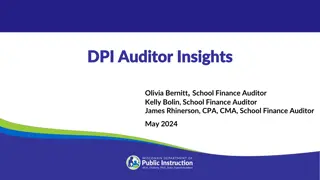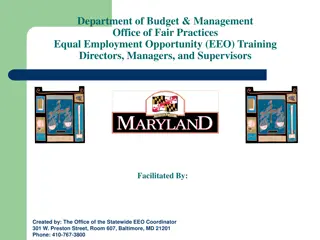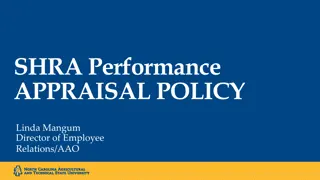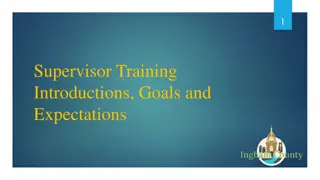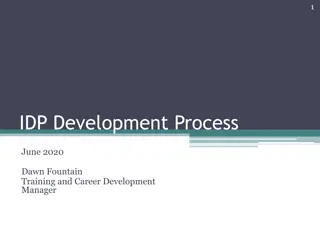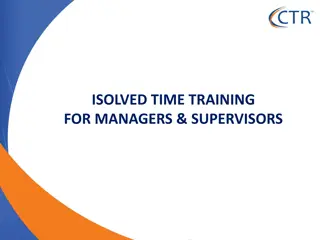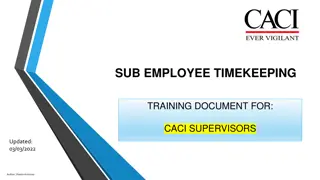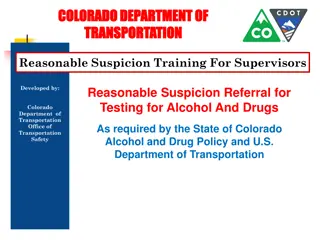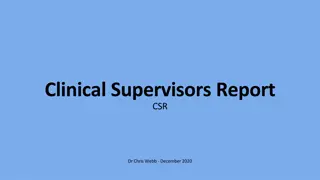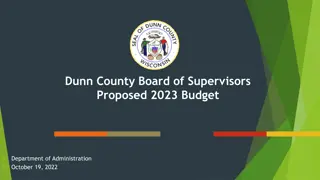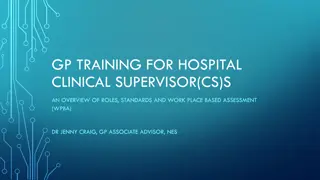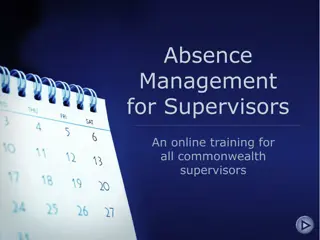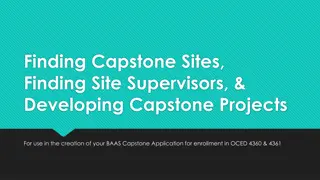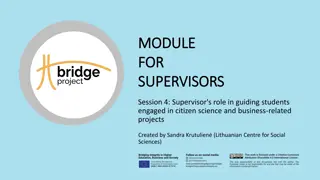Guidelines for Banting Applications - Supervisors' Insights
This detailed guide provides supervisors with key insights on evaluating Banting applications. Emphasizing the importance of demonstrating commitment, leadership potential, and research synergy, it covers aspects such as supervisor biography, research environment, and professional development to facilitate the selection of top-tier postdoctoral researchers for collaborative projects.
Download Presentation

Please find below an Image/Link to download the presentation.
The content on the website is provided AS IS for your information and personal use only. It may not be sold, licensed, or shared on other websites without obtaining consent from the author.If you encounter any issues during the download, it is possible that the publisher has removed the file from their server.
You are allowed to download the files provided on this website for personal or commercial use, subject to the condition that they are used lawfully. All files are the property of their respective owners.
The content on the website is provided AS IS for your information and personal use only. It may not be sold, licensed, or shared on other websites without obtaining consent from the author.
E N D
Presentation Transcript
Information for Supervisors Banting Applications
SUPERVISORS STATEMENT OVERVIEW Goal is to demonstrate the . Degree to which the institution and supervisor are committed to the applicant Supervisor and institution s capacity to enable the applicant to become a future leader in their chosen field Applicant s potential to build upon the institution's strategic priorities Sections Supervisor's biography (concise, relevant to application) Appropriateness of the supervisor(s) Research environment (support research and leadership potential) Professional development Institutional synergy Note If the proposed supervisor is also providing a referee assessment there should be minimal duplication of information between the two documents. Supervisors should be highly selective and recommend only the highest-calibrepostdoctoral researchers. SCHOOL OF GRADUATE STUDIES www.mun.ca/sgs/
SUPERVISORS STATEMENT: APPROPRIATENESS Supervisor s biography Must be concise and include only information relevant to the application. Describe the supervisor s academic and research background, key contributions/accomplishments and funding to date. Appropriateness of the supervisor(s) Describe the fit between the research interests/background of the supervisor and applicant, and the anticipated mutual benefits (this also feeds into research excellence of applicant) Be specific about how the proposed research complements the supervisor s ongoing projects and/or new research directions. This should be a wonderful match; both bring something the other isn t an expert in, but when combined enable some outstanding research to happen Detail the contributions of the supervisor and applicant in the design and development of the proposed research. Banting should be the lead, but the project should be collaborative SCHOOL OF GRADUATE STUDIES www.mun.ca/sgs/
SUPERVISORS STATEMENT: RESEARCH ENVIRONMENT Clearly state the supervisor's and lab/department's commitment to support the applicant s research and develop their leadership potential. Examples: Mentorship; opportunities for collaboration, dissemination, and/or knowledge translation; resources (e.g., funding, facilities, personnel) Core Research Equipment and Instrument Training (CREAIT) Network Beowulf Cluster (24 high performing computers, Math Department) AceNET: Access high performance and big data computing resources. If RIIG Describe how respectful relationships are being developed to engage relevant Indigenous communities and to promote reciprocity in terms of the benefits derived from the research process and outcomes. Describe support provided to facilitate collaborations between the applicant, the host institution and Indigenous communities/partners. The supervisor must provide details corroborating information provided in the research proposal. SCHOOL OF GRADUATE STUDIES www.mun.ca/sgs/
SUPERVISORS STATEMENT: PROFESSIONAL DEVELOPMENT Describe the institution's commitment to the applicant's professional leadership development by clearly indicating the resources and/or mentoring activities that are available through the institution to support career development. Career counselling The Dean of the School of Graduate Studies will meet with the Banting winners once a semester during their first year and arrange other mentoring opportunities for these students to avail of including meetings with the Associate Vice President of Research and the Associate Dean of Research within their respective home units. SGS EDGE (Enhanced Development of the Graduate Experience) A collection of professional development services that foster skills and knowledge around several themes: Leadership/management; Communication/interpersonal skills; Critical/creative thinking; Integrity/ethics; Societal/civic responsibility; Career development; and Research SCHOOL OF GRADUATE STUDIES www.mun.ca/sgs/
SUPERVISORS STATEMENT: PROFESSIONAL DEVELOPMENT Training in preparing grant proposals, publications and presentations Access to staff support (SGS support, GFOs) Eligibility for internal grants (MUCEP, funds through Office of Public Engagement, etc.) Research funding $10,000/yr research grant (cost shared between SGS and VPR) Training in knowledge translation/mobilization Work with Faculty Communication Coordinators Leading established departmental public outreach activities Speakers at prominent lecture series we host Perhaps, stay tuned: Marketing & Communications can provide training in web content management and writing for the web Perhaps, stay tuned: Training through Office of Public Engagement SCHOOL OF GRADUATE STUDIES www.mun.ca/sgs/
SUPERVISORS STATEMENT: PROFESSIONAL DEVELOPMENT Training in intellectual property regulations Technology Transfer and Commercialization Office (TTCO) provides IP101 sessions for research teams and entrepreneurs on campus. The TTCO will help you navigate the disclosure process to help move your ideas towards commercialization. Perhaps, stay tuned: Proposal Concept Support with TTCO: Work with you at the ideation stage to align your research project with industry needs, and assist with market analysis, prior art searches, funding, and intellectual property. Perhaps, stay tuned: Translational R&D Program (100 hrs over 3 semesters) helps graduate students explore their research through an innovation and commercialization lens. Graduate students will evaluate the potential of their research for commercialization, complete courses, and receive coaching. See also: Training through Memorial Centre for Entrepreneurship (MCE) SCHOOL OF GRADUATE STUDIES www.mun.ca/sgs/
SUPERVISORS STATEMENT: PROFESSIONAL DEVELOPMENT Guidance on ways to improve teaching and mentoring skills SGS TSEP (Teaching Skills Enhancement Program) Offered over two semesters, the first focusing on skill acquisition, the second on a teaching apprenticeship and learning portfolio, results in certificate SGS Program in Graduate Student Supervision (PGSS) / Graduate Supervisor Institute Normally for faculty, but Bantings will be permitted Designed to provide an introduction for faculty to important aspects of graduate student supervision. Results in certificate Perhaps; stay tuned: CITL Course Design Institute (CDI) Usually only for people teaching in the upcoming academic year A four-module program for instructors to learn a systematic approach to designing a learning-centred course plan and syllabus. SCHOOL OF GRADUATE STUDIES www.mun.ca/sgs/
SUPERVISORS STATEMENT: PROFESSIONAL DEVELOPMENT Guidance on ways to improve teaching and mentoring skills Perhaps, stay tuned: Learning technology coaches Support instructors with using various tools in Brightspace course sites, using Webex for instruction and office hours, investigating other learning technologies to create accessible and engaging learning experiences for students. Perhaps, stay tuned: Access to teaching consultant support through CITL Consulting services: To identify teaching questions or challenges, and explore strategies to address those issues. Teaching dossier assistance Classroom observation (including report and exploration of strategies to address teaching challenges or areas for development) SCHOOL OF GRADUATE STUDIES www.mun.ca/sgs/
SUPERVISORS STATEMENT: PROFESSIONAL DEVELOPMENT Guidance on how to effectively collaborate with researchers and knowledge users from diverse backgrounds and disciplinary areas Opportunities for collaboration and networking Specific efforts the supervisor can take to integrate the Banting into their network Networks or Centers located at Memorial (eg. Ocean Frontier Institute) Training in responsible professional practices Statistics Consulting Centre (Math Department) Teaching opportunities Supporting an application for Adjunct Status Per course instruction (unionized, but there s an Adjunct exemption) Officially co-supervising grad students Undergraduates: MUCEP, honours, WiseNL Help CGS-M / CGS-D applicants SCHOOL OF GRADUATE STUDIES www.mun.ca/sgs/
SUPERVISORS STATEMENT: INSTITUTIONAL SYNERGY Describe the institution's documented strategic priorities, and illustrate the synergy between these priorities and the applicant's proposed research program. Clearly justify the institution's endorsement of the applicant in light of the institution's strategic priorities, and articulate how the institution and applicant will benefit from this engagement. This can range from a simple the research falls under this category to quite integrated, having a clear impact on Memorial s growth Refer to very specific and explicitly stated strategic priorities (nice to have direct quotes from strategic documents) SCHOOL OF GRADUATE STUDIES www.mun.ca/sgs/
